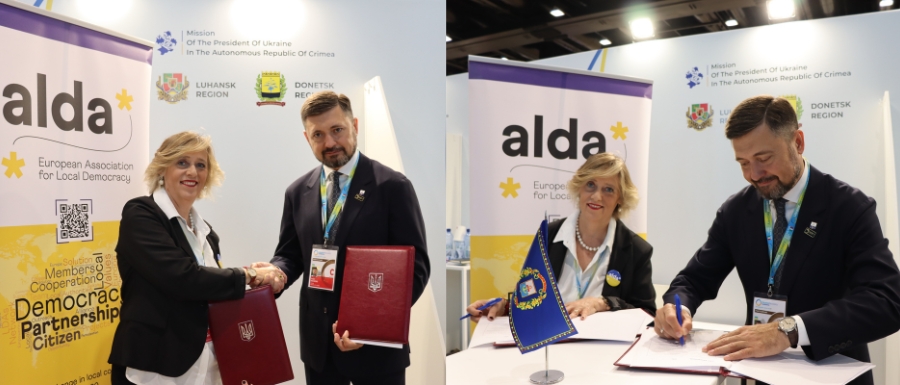This article is in English 🇬🇧, for the Ukrainian 🇺🇦 version click here.
At the Ukraine Recovery Conference held in Rome on 10–11 July 2025, Vadym Boichenko, Mayor of Mariupol (Ukraine) unveiled an innovative model for social and affordable housing. Rooted in the Mariupol Reborn initiative, the project responds to one of the most urgent challenges of post-war Ukraine: ensuring decent, stable housing for millions of internally displaced persons (IDPs) affected by russia’s full-scale invasion. The model is already being piloted in Bila Tserkva, where a complex of ten buildings will soon provide homes for approximately 1,500 displaced Ukrainians. Each unit will be fully equipped with interiors, furniture, and appliances—ready to be lived in, not just occupied.
What makes this model stand out is its foundation in collaboration and best practices. Developed jointly by the Mayor’s Office, Big City Lab, PUPA, and Civitta, the project draws inspiration from successful European experiences—particularly in France, Poland, the Netherlands, and Austria—tailored to Ukraine’s specific social and economic context.
The housing solution is built on four pillars:
- Affordability, with monthly rents capped at 30% of average income (approx. 5,000 UAH), and adjusted according to individual needs and available subsidies;
- Human-centred design, offering energy-efficient construction, renewable energy integration, and communal spaces to foster social bonds;
- Transparent allocation, using a points-based system that prioritises vulnerable groups such as veterans and large families;
- Scalability, with an architectural concept designed for replication across other Ukrainian cities.
This ambitious initiative has gained the support of a wide network of national and international actors. The Ministry for Development of Communities and Territories of Ukraine, local authorities, and a number of global partners—including the Council of Europe, the European Investment Bank, UNHCR, and city leaders from Gdańsk (Poland) and other European cities—have all endorsed the project.
ALDA’s Support to the Initiative
In this context, ALDA has strengthened its commitment by entering into a formal partnership with the Mariupol City Council. On the second day of the conference, the two parties signed a Memorandum of Understanding, setting a clear framework for long-term collaboration aimed at addressing one of the most critical challenges for internally displaced persons (IDPs) from Mariupol: access to affordable social housing.
The agreement outlines specific areas of cooperation, including the joint implementation of housing projects, mobilisation of European expertise, and the creation of participatory mechanisms that ensure IDPs are actively involved in shaping housing solutions that respond to their needs. It also emphasises the importance of engaging donors, investors, and public funding sources, and draws on international best practices in post-crisis housing provision. Beyond bricks and mortar, the MoU lays the groundwork for initiatives supporting employment, community integration, and ultimately, the voluntary return of displaced persons.
As noted by Antonella Valmorbida, Secretary General of ALDA:
“Social housing is not just a roof over one’s head – it is a tool for ensuring stability and economic growth in the regions. ALDA, which unites over 300 municipalities from across Europe, understands well that providing decent living conditions is key to the sustainable development of communities and the country as a whole. For Ukraine, which is experiencing a wave of forced displacement, creating a stock of quality social housing offers people the opportunity to remain in the country, feel safe, and build a future. At the same time, it creates the conditions for the return of those who were forced to go abroad. ALDA supports this initiative and is ready to share European experience in developing social housing.”
As part of its ongoing commitment to Ukraine, ALDA facilitated a key meeting between Roma Capitale, represented by Andrea Tobia Zevi, Councillor for Public Assets and Housing Policies, and the delegation of Mariupol, led by Deputy Mayor Sergiy Orlov and Olga Pikula, Head of International Relations and Communications for Mariupol Reborn. The meeting provided a valuable opportunity for dialogue on social housing models and best practices for the integration of internally displaced persons (IDPs).
This strategic cooperation gains even more relevance in light of recent developments: the Ukrainian Cabinet has endorsed a two-year pilot programme aimed at expanding municipal social housing and supporting preferential mortgages—particularly for IDPs from Mariupol.
For Mayor Boichenko, however, the vision goes beyond buildings. The project is about restoring a sense of home, belonging, and hope. It aspires to create the conditions for displaced Ukrainians to return and rebuild—not only cities, but communities. In this light, the housing initiative becomes more than just a policy: it is a symbol of recovery, civic strength, and the determination to shape a future grounded in dignity and care.
ALDA’s commitment to supporting Ukraine goes hand in hand with the active engagement of its wider network. On 14 October 2025, during the European Week of Regions and Cities in Brussels, ALDA Governing Board member, the Diputació de Barcelona, will organise a session on housing, in partnership with the municipalities of Barcelona, Rome, Sabadell, and Zagreb. This workshop will provide a platform for local authorities to share experiences, tackle common challenges, and reaffirm the importance of affordable housing as a long-term European policy priority.
This initiative is part of the broader effort promoted by ALDA and its members to support Ukrainian communities. The collaboration with the Municipality of Mariupol on social and affordable housing is closely linked to the European Social fairness policy and the Affordable houses programmes.
ALDA acts as a connector between Ukrainian municipalities and the European institutional space, ensuring that the voices of local communities are heard. We look forward to continuing this dialogue at the high-level consultation at the European Economic and Social Committee , where Ukrainian partners will also be present.
